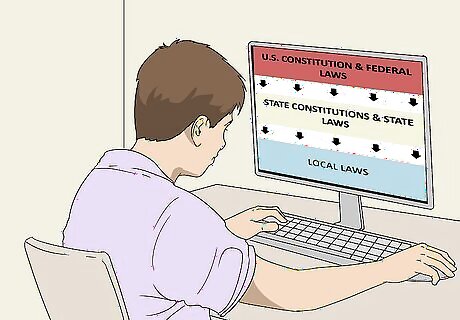
views
Evicting a Roommate

File for an eviction in extreme circumstances. Evicting your roommate can be a long and expensive process and can only be done if your roommate isn't on the lease. If your roommate isn't paying rent or is in violation of another major agreement, you may want to consider eviction. Remember that eviction is a legal process. You may want to consider hiring a lawyer if you're considering eviction. If your roommate is annoying but not in violation of any agreement, eviction probably isn't your best option.

Figure out who is on the lease. If you aren't on the lease, you will have to be the one to move out. If your roommate isn't on the lease, you may be able to kick them out. If you're both on the lease, you'll have to wait out the end of the lease and then make other arrangements. In some extreme cases, such as your roommate becoming extremely violent, you can get an Order of Protection and evict them. You can also evict someone who is legally subletting a room if you have "just cause" (for example, if they aren't paying rent).

Look into your state's eviction process. In some places, even if your roommate isn't on the lease, if they have been living in the apartment and/or paying rent, they are entitled to stay in the apartment for a certain period of time. They can only be evicted after that time is up. You can find out what your state's laws are by searching "[your state] tenant eviction." Each state has a different law, and some cities have additional laws about when and how someone can be evicted.

Send your roommate an eviction notice. Write a letter that shows that your roommate is in breach of agreement (for example, not paying rent or illegally subletting) and you intend to pursue legal action. Even if your roommate isn't on the lease, if you have a document detailing the terms your agreement, you can use this to show that your roommate broke the agreement. If not, you will have to convince a court that your roommate is in breach of a spoken agreement. Search for an eviction notice template online to see examples of how to word and format the notice. It's best to have a written agreement in place before a roommate moves in so that you can prove your roommate violated an agreement. At the very least, put in writing how much they will pay in rent and when rent is due. Other terms could be no pets or no overnight guests.

File a petition for eviction at your local court. If your roommate isn't on the lease, you are considered to be a landlord and your roommate is considered to be a tenant, so you will go through a Landlord/Tenant eviction process. Find more information about what that process will look like for you at your local courthouse. You will likely need to fill out a form to request a court date, and provide documentation that your roommate is in breach of agreement. Be aware that the process can take a couple of months and your roommate can dispute it. The process will be slightly different for each city. Look into what documentation you will need to provide and make sure you have it when you go to court.

Go to court if your roommate doesn't move out. Almost everywhere, you will need to provide your roommate with advance, written notice 15-30 days before you evict them. If your roommate doesn't move out after receiving notice, a judge may either find that your roommate is in breach of agreement and evict them, or that you don't have a case and your roommate can stay. You can't forcibly evict your roommate. If your roommate doesn't comply with the eviction, a judge will ask law enforcement to help you. If your roommate disputes the ruling, they can legally stay in the apartment until a final decision is made.
Breaking the News to Your Roommate

Keep track of your roommate's annoying behaviors. This will help you reference facts and specific incidents and point out a pattern of behavior. Keep a running list with dates and times and what exactly occurred. When you have a conversation with your roommate, you can refer to specific incidents rather than making generalizations. If you think you might take legal action or go to your landlord, it can be useful to take a picture. This is especially important if your roommate isn't paying rent, isn't on the lease, or has given a set of keys to someone who isn't on the lease. Keep in mind that if your roommate pays the rent on time and isn't damaging the apartment, your landlord will likely be unwilling to kick them out.

Pick a time to talk when you are both calm and open to conversation. Have the conversation when you are calm, sober, and have enough mental energy to have an honest conversation. Don't start the conversation if either one of you is in a rush––for example, if you're heading out to work or class. You might also want to avoid bringing this up if either one of you is tired after a long day. A good time might be a weekend morning that you both have off. If your roommate doesn't have a calm personality, pick a time when you are calm.

Give your roommate enough time to find another living arrangement. Choose the timing of the conversation wisely. If you tell your roommate you want them to move out months before your lease is up, expect high tensions until your roommate can move out. However, don't give them such short notice that they can't find another housing situation. Make sure you give a firm date that you need your roommate moved out by. If you can't live with your roommate through the end of the lease, you may have to consider moving out yourself and finding a subletter. You can't reasonably ask your roommate before the lease is up, unless they aren't paying rent or aren't on the lease. If your roommate isn't on the lease, you can ask them to move out at any time. You don't have to wait until your lease is up. However, give them a reasonable amount of time to find another place to live.

Address what is bothering you before asking your roommate to move out. Some people have habits they don't realize are annoying until they live with other people. It's possible that a brief conversation where you mention the behaviors that are bothering you will help your roommate fix the problem and not need to move out at all. For example, say something like, "You like to listen to music really loudly at 2am. That makes it hard for me to get enough sleep and get up for work in the morning. Can you try wearing headphones or turning down the music?" Be clear about what exactly is bothering you. Giving reasonable alternatives can help smooth over the conversation.

Tell your roommate you'd like to live alone or with someone else to avoid confrontation. Rather than telling your roommate directly that you'd like them to move out, consider framing your request more positively. Tell your roommate that when the lease is up, you have a friend you want to move in or you'd like to try living alone. This takes the focus off of your roommate's behavior. If you have someone in mind that you would like to live with, try saying something like, "I've really enjoyed living with you, but one of my best friends is moving and I'd like to try living with them when our lease is up." If your roommate is a friend, using this approach can help preserve the friendship after they move out. Saying, "I value our friendship, but I just really want experience living alone," can help nudge them out without making any accusations.

Tell your roommate directly you don't want to continue living together. The direct approach is the healthiest approach. Tell your roommate exactly why you don't think you'll be able to continue living with them. Remember that asking someone to move out is a big deal and be respectful when answering questions your roommate will probably have. Say something like, "I tried to make this situation work, but I don't think we work as roommates. Your schedule staying up all night every night and my work schedule just aren't working out. I think it's best if I find a roommate whose habits line up better with mine."

Use direct and clear language to avoid misunderstandings. No matter if you use a direct or indirect approach to the conversation initially, make it clear that you want your roommate to move out. Avoid using any combative or defensive language. Instead, focus on what you need and the boundaries you want to set. Give firm dates or timelines. For example, you can say something like, "I think it's best if you move out. Our lease is up in 2 months. Can you find a new place to live by then?" If you want to give your roommate a bit more of a nudge, you can offer to help them look for new places or even offer to help them move. The more help you can give, the more likely your roommate is to make the move.

Bring in an intermediary if necessary. If you have a hard time staying calm or you need some extra support, consider bringing in a third party to help you through the conversation. A mutual friend that you both trust is ideal, as they can help you keep a level head and back either of you up if things get out of hand. Be aware that bringing in another party can make it seem like you're ganging up on your roommate. Some people will react with hostility.

Offer to help pay for a move if you can. If your roommate just moved in, it may not be financially feasible for them to move out again right away. If you are asking them to move out, you may want to ease the transition by offering to pay application fees or move-in fees, or waiving rent for their last month in the apartment. Only offer what you can afford to pay. This can be a good option if your roommate is a friend and you want to make a peace offering.




















Comments
0 comment